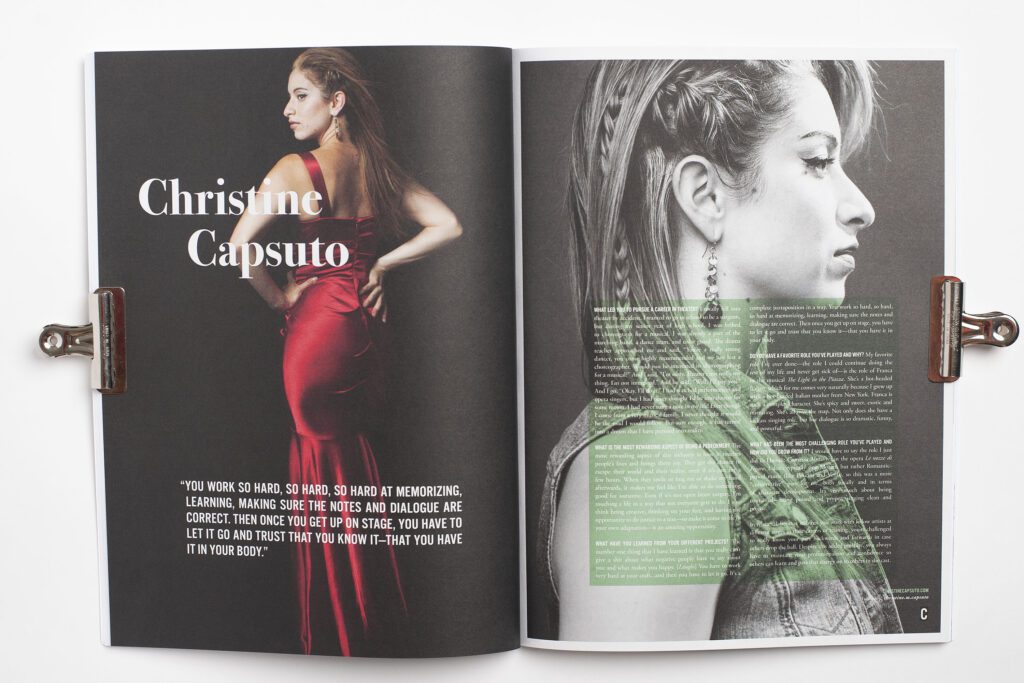
What led you to pursue a career in theater? I totally fell into theater by accident. I wanted to go to school to be a surgeon, but during my senior year of high school, I was bribed to choreograph for a musical. I was already a part of the marching band, a dance team, and color guard. The drama teacher approached me and said, “You’re a really strong dancer, you come highly recommended and we just lost a choreographer. Would you be interested in choreographing for a musical?” And I said, “I’m sorry. Theater’s not really my thing. I’m not interested.” And he said, “Well, I’ll pay you.”
And I go, “Okay. I’ll do it.” I had watched performances and opera singers, but I had never thought I’d be into theater for some reason. I had never sung a note in my life! Even though I come from a very musical family, I never thought it would be the road I would follow. But sure enough, it has turned into a dream that I have pursued into reality.
“You work so hard, so hard, so hard at memorizing, learning, making sure the notes and dialogue are correct. Then once you get up on stage, you have to let it go and trust that you know it—that you have it in your body.”
What is the most rewarding aspect of being a performer? The most rewarding aspect of this industry is how it touches people’s lives and brings them joy. They get the chance to escape their world and their reality, even if it’s just for a few hours. When they smile or hug me or shake my hand afterwards, it makes me feel like I’m able to do something good for someone. Even if it’s not open heart surgery, I’m touching a life in a way that not everyone gets to do. I also think being creative, thinking on your feet, and having the opportunity to do justice to a text—to make it come to life in your own adaptation—is an amazing opportunity.
What have you learned from your different projects? The number one thing that I have learned is that you really can’t give a shit about what negative people have to say about you and what makes you happy. [Laughs] You have to work very hard at your craft…and then you have to let it go. It’s a
complete juxtaposition in a way. You work so hard, so hard, so hard at memorizing, learning, making sure the notes and dialogue are correct. Then once you get up on stage, you have to let it go and trust that you know it—that you have it in your body.
Do you have a favorite role you’ve played and why? My favorite role I’ve ever done—the role I could continue doing the rest of my life and never get sick of—is the role of Franca in the musical The Light in the Piazza. She’s a hot-headed Italian, which for me comes very naturally because I grew up with a hot-headed Italian mother from New York. Franca is such a complex character. She’s spicy and sweet, exotic and nurturing. She’s all over the map. Not only does she have a kickass singing role, but her dialogue is so dramatic, funny, and powerful.
What has been the most challenging role you’ve played and how did you grow from it? I would have to say the role I just did in Hawaii: Contessa Almaviva in the opera Le nozze di Figaro. I don’t typically sing Mozart, but rather Romantic period music (like Puccini and Verdi), so this was a more “conservative” part for me, both vocally and in terms of character development. It’s very much about being contained—being poised and proper, singing clean and precise.
In rehearsal, because so often you work with fellow artists at different stages in their careers or training, you’re challenged to really know your part backwards and forwards in case others drop the ball. Despite this added pressure, you always have to maintain your professionalism and confidence so others can learn and pass that energy on to others in the cast.
christinecapsuto.com
facebook: christine.m.capsuto
Featured in issue 8.3 “Show,” Fall 2016

